#170734 - 04/30/18 07:01 PM
 Re: The Big Tough Folder...
[Re: Lofty]
Re: The Big Tough Folder...
[Re: Lofty]
|

Knife Enthusiast
Registered: 02/06/16
Posts: 656
|
Hey, DS, this is not thick enough hilt for a folder!? You are a sick man! hahaha 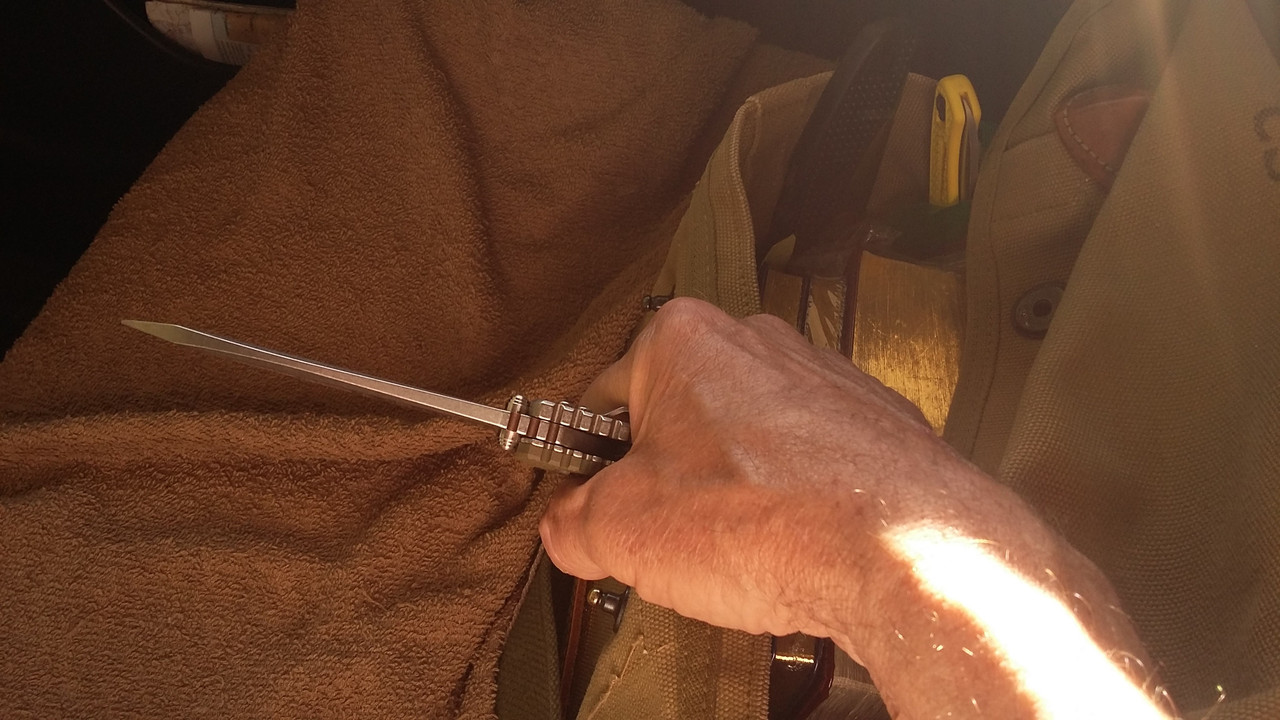 If, by some chance, a translation error, and thickness of hilt might be depth of hilt, they do those, too. Non-flippers, as well. 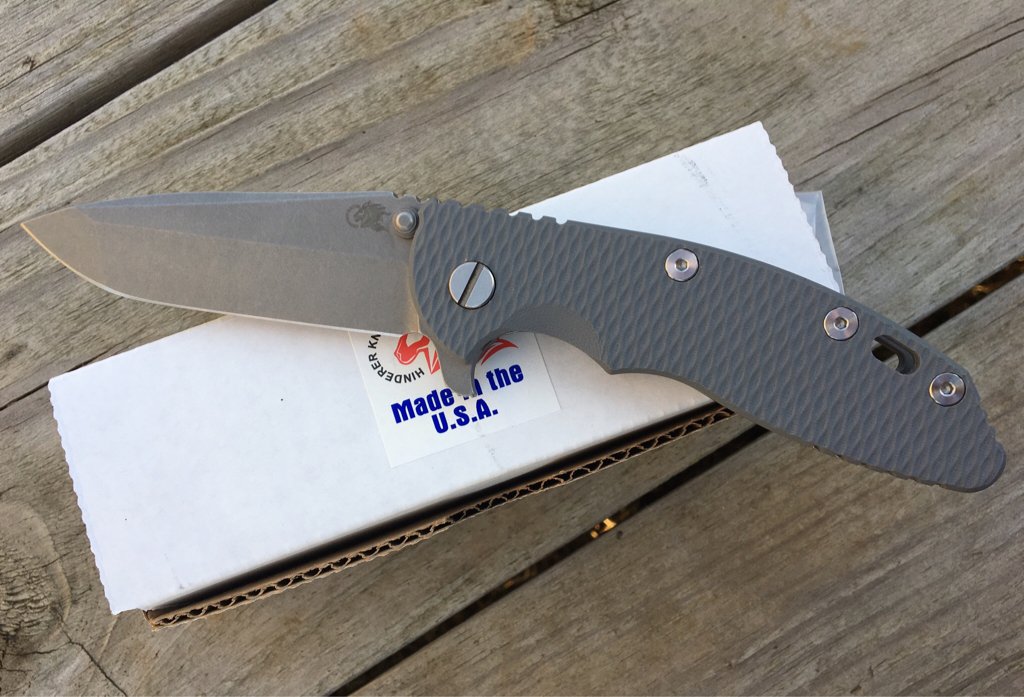 I gotta stick in a plug for my old green radio bag. We go back a loooong way, and even as a civilian, used it for everything, including airline carry-on bag, until..... They started sniffing for explosives. Carrying this bag today is a surefire way to get sidelined and every content of bag opened and inspected, to include books, and every bag seam sniffed and examined. What is the world coming to when a guy cannot even carry a grenade with him anymore, I ask you?
Edited by Lofty (04/30/18 07:36 PM)
_________________________
Cadent a latere tuo mille, et decem millia a dextris tuis;
ad te autem non appropinquabit.
|
|
Top
|
|
|
|
#170754 - 05/01/18 04:27 AM
 Re: The Big Tough Folder...
[Re: Lofty]
Re: The Big Tough Folder...
[Re: Lofty]
|

Knife Enthusiast

Registered: 09/25/13
Posts: 1159
Loc: the other side of the earth
|
Hey, DS, this is not thick enough hilt for a folder!? You are a sick man! hahaha I often hear this question, but for a different reason, most people do not understand why I have a knife or a flashlight is more expensive than 10-15 dollars  All this is only a matter of personal preferences and conditions of use. I have to cut wires and wooden sticks from time to time, so I really want the handle to put less pressure on the hand  Here are some that are constantly in use  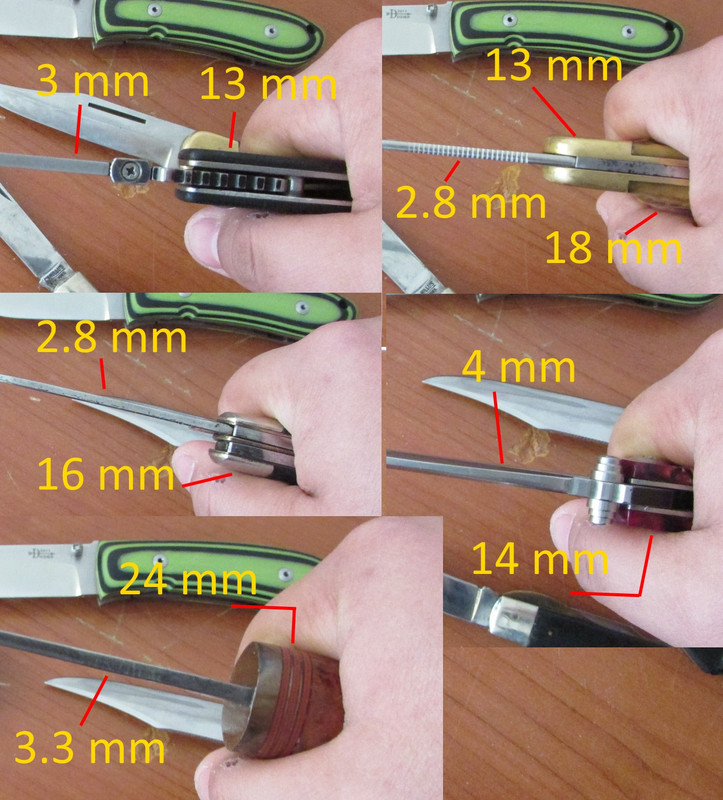 I indicated the thickness of the handles. The most convenient knife for my business it's with fixed blade and this one, which I did not take pictures (Stanley 199) From folding knife me it is most convenient Camillus TL-29 and Puma Prince, BUT their axial knots and backlock on the Puma too weak. When I start to cut something hard and viscous, I'm afraid to give more strength, since there is a suspicion that I will damage the construction of the knife... The most durable are the CQC8 and converted from a Microtech Socom Delta (red scales), But the thickness of the handle is a little less than I want (I will be comfortable about 18-20 mm) and sharp edges of scales. In fact, this is not a problem, I can unscrew them and replace them with thicker ones. The situation with frame locks is quite different, I do not have the equipment to drill holes in the titanium, made threads and fit additional scales. Now I'm looking at Winkler II F-3 Flipper, He also has a thin handle, but it has a good rounding scales. Another very proper knife, in terms of convenience and durability this Strider SJ-75, but because of the closure of the company they are now more of a collector's thing  p.s. Carrying grenades in a bag is dangerous in terms of their inherent danger in the assembled state, is necessary to transport them in disassembled condition, but then a lot of time is lost for their assembly 
_________________________
Si vis pacem, para bellum
|
|
Top
|
|
|
|
#170759 - 05/01/18 11:43 AM
 Re: The Big Tough Folder...
[Re: desert.snake]
Re: The Big Tough Folder...
[Re: desert.snake]
|

Knife Enthusiast
Registered: 02/06/16
Posts: 656
|
I totally agree as to handle comfort, and if you are really needing to lean on a knife to push cut heavy wire, etc, or chest lever, the fat handle and stout blade the way to go, and thin blade if it will handle the work. OOPS, there we go talking puukkos and etc again, but, better than Glock. Folders and handguns much the same. Only field expedient until you can access fixed blade or rifle. For the record, the large XM is 4.7mm thick blade, 15mm thick handle, 6.35mm pivot. Let's see. You cut wires and sticks, and lecture me about grenade safety. So, you do demolition work for a living, I see, with IEDs part time, for fun and profit. As for grenade safety, it is the same as old Texas Ranger Charlie Miller, a very earliest 1911 user in law enforcement, who carried his 1911 on half-cock, round chambered, grip safety tied down with rawhide, and carried IWB up front, no holster. Another younger officer told him it looked dangerous, and Charlie replied, "Son, if it wasn't dangerous, I wouldn't carry the damned thing." Our grenades are completely safe to carry assembled. Just ask the manufacturer. They even offer a full refund if any problems, and point out nobody has yet to ask for one. I know the Stanley well, mainly used an older version of this type, though, with no retraction, either. Blades snap under heavy pressure, though, and if your hand flies across broken stuck blade piece during any pushing cut, it makes a ZING sound, ask me how I know. You learn to always have blade trailing hand, after that, and ignore top edge, even for upward cuts when ripping thick plastic sheet.  Thank you very much for posting the knives of yours, as for the big, tough, folder class, had hoped for more detail from more folk as for heavy duty folders they hopefully use. As for cost, pride in ownership for well crafted tools is one part of it, and for we users, that the knife actually perform as good as it looks, is a huge part of why the money spent. I do not buy pretty junk. If it does not work, it is not bought, or does not stay. As for cost, Part 2, just recently bought a lightweight version of a knife for circa $120, found scales abraded clothing, knife looked and felt cheap in opening/closing, and ended reordering the standard construction version at $160 with steel liners and relatively smooth G10 scales, as little blade and handle shape quite good. BUT, could now have bought a nicer knife in total outlay of cash. Still make rookie mistakes, which is trying to buy a lighter/cheaper version than the "real" thing.
Edited by Lofty (05/02/18 10:23 AM)
_________________________
Cadent a latere tuo mille, et decem millia a dextris tuis;
ad te autem non appropinquabit.
|
|
Top
|
|
|
|
#170763 - 05/01/18 01:35 PM
 Re: The Big Tough Folder...
[Re: Lofty]
Re: The Big Tough Folder...
[Re: Lofty]
|

Knife Enthusiast
Registered: 02/06/16
Posts: 656
|
Since nobody but DS and I want to play on this topic, will give a little more detail on the Hinderer, which is his "working finish". My understanding is that it is accomplished via stone washing, then bead blasting (which is different than sand blasting, which they also do), then another stone washing. Although I jokingly call it a high grade padlock finish, it is a very good finish for a user. a) It subdues glare/flare/flair, b) there is nothing to scratch off with use, c) signs of use blend right in, and best of all, d) it still a glazed surface and smooth to the hand and while cutting, especially in cutting, with no increase in drag caused by many finishes and treatments. 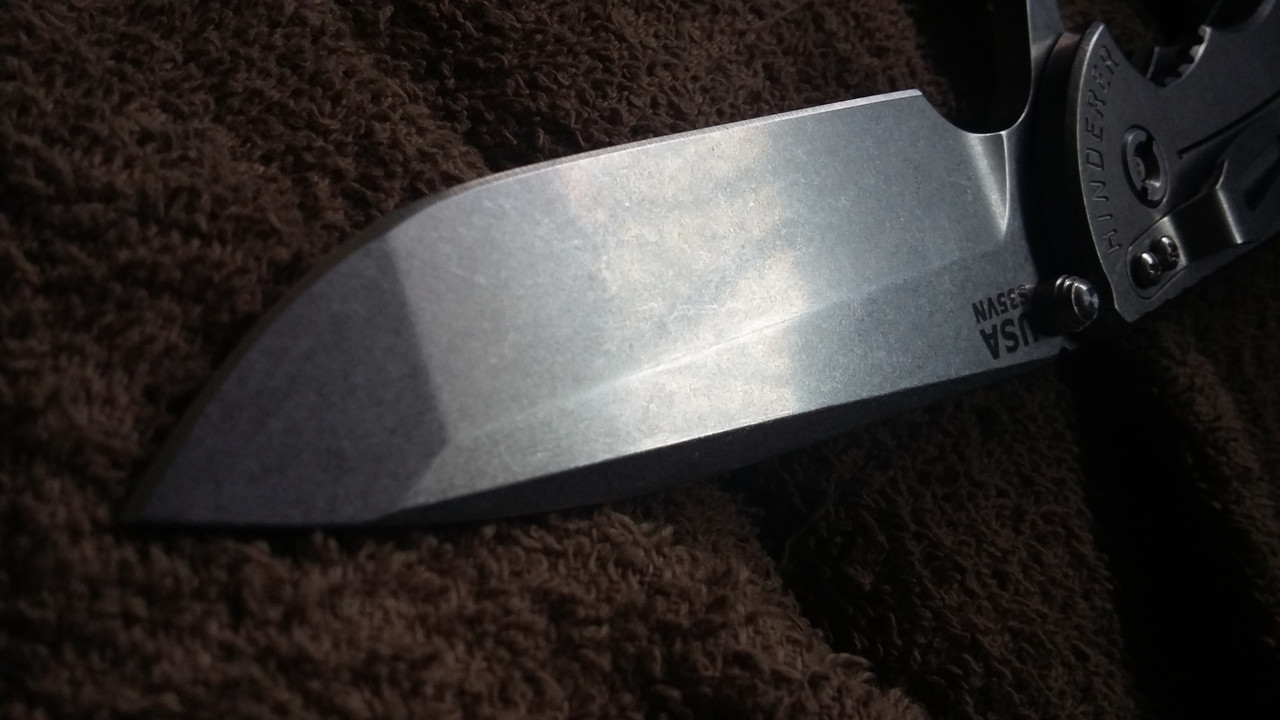 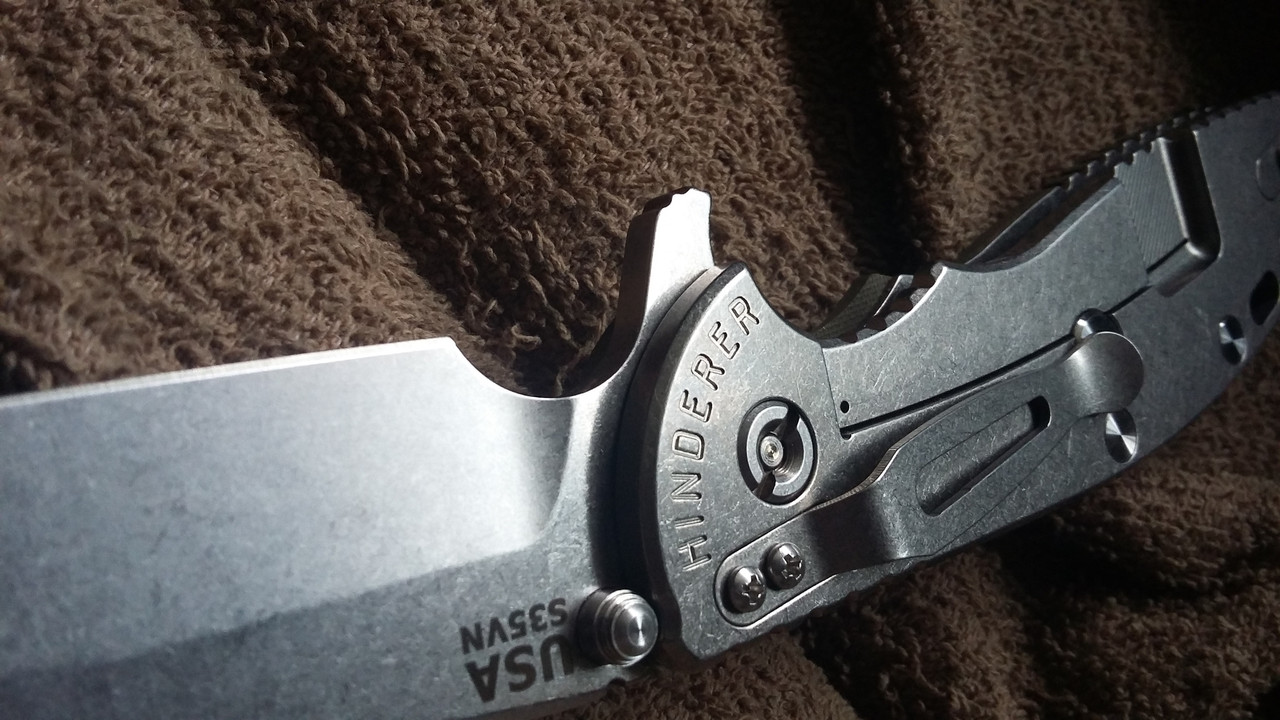 And also a short foray into what handle color to either buy or swap, they sell about everything, including small parts of many colors/materials. As for small parts, originals are steel, and personally do not wish to weaken knife with titanium screws and nuts. The spacers only subject to compressive, vs shear and tension, loads were safe enough, and I like the fire-blued steel look missing from most modern goods, when formerly rather common on tools. The handle color really only up to personal aesthetics, or how well one wants it to hide crud from use. But no work or mission reason to pick one over the other. Clipped anywhere, especially IWB, the color is against body and invisible. Laid down or dropped, a 50/50 chance it will be color side down, and invisible. This last item is changing, if desired, as the shop has just started offering scales with clip positions at either end, as optional aftermarket accessory. Personally, I hate knives covered with drilled unused holes. 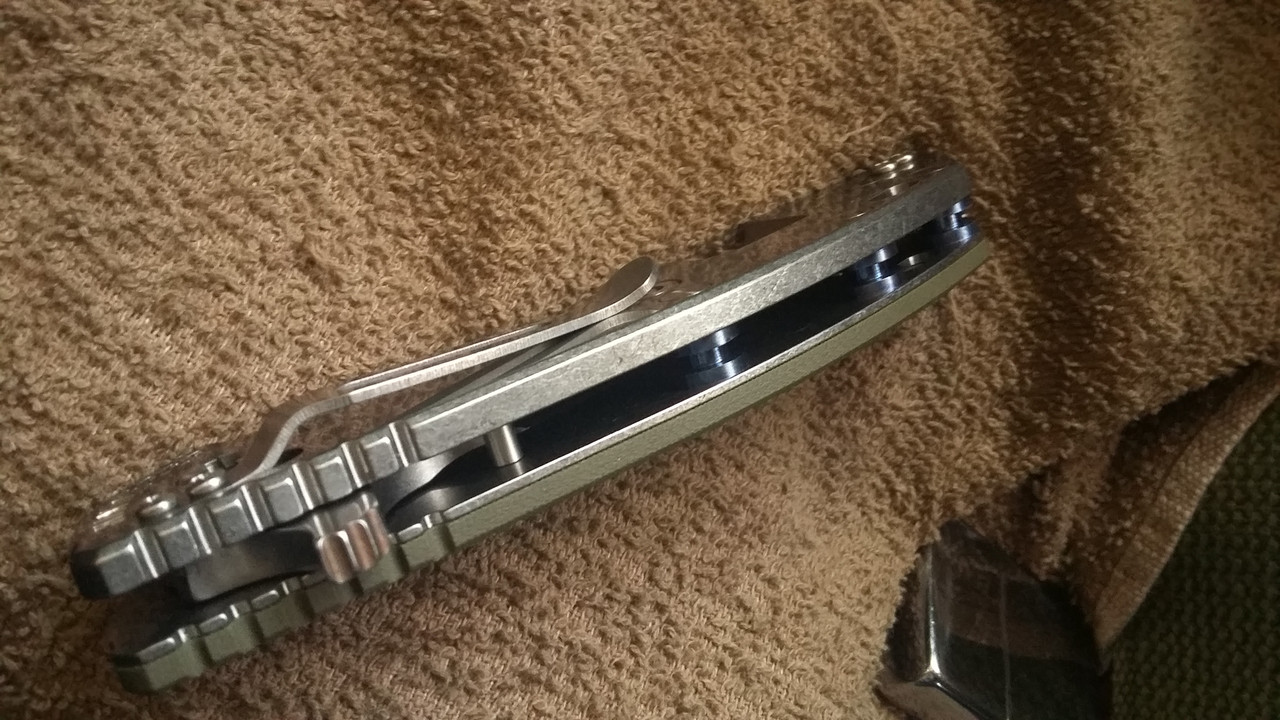 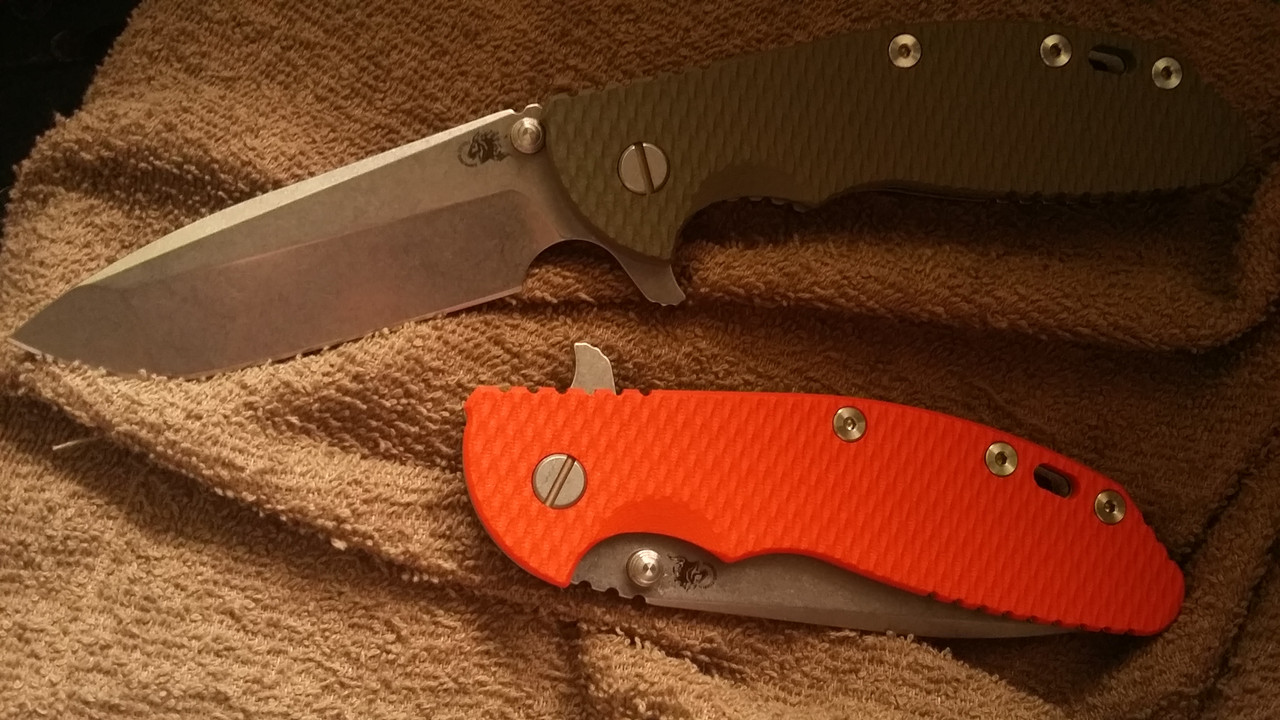
Edited by Lofty (05/01/18 07:34 PM)
_________________________
Cadent a latere tuo mille, et decem millia a dextris tuis;
ad te autem non appropinquabit.
|
|
Top
|
|
|
|
#171007 - 05/08/18 02:34 PM
 Re: The Big Tough Folder...
[Re: Lofty]
Re: The Big Tough Folder...
[Re: Lofty]
|

Knife Enthusiast
Registered: 02/06/16
Posts: 656
|
As for variations on a theme, Barbie dress-up playtime, by Mattel! Alternative scales, materials, special runs and styles of blades, hardware, flipper yes/no, even to knives ground, finished, and tuned, still, by Rick. The astute observer might notice the 3.5" XM-18 with carbon fiber has a blade as thick as the XM-24 above. Obvious flags for varieties being a stenciled F on flipper for a Fatty, S for a Skinny. Handmade easy to spot as they are conventionally hollowground, even if finished differently such as satin/beadblast. Newer also stenciled with Rick's signature, my spearpoint predates lased markings, at all. As with anything, there is period correct, and not period correct. Of all the knives, the orange would look best with blue hardware (bronze, brass, copper also available). But, alternative hardware was not offered at the time this non-marked blade was ground. So, rather than give some viewer thoughts of, "I wonder what else is messed with...", it stays bone stock, unscratched, the only non-user of the lot, being worth 3-4 times value of stock versions. 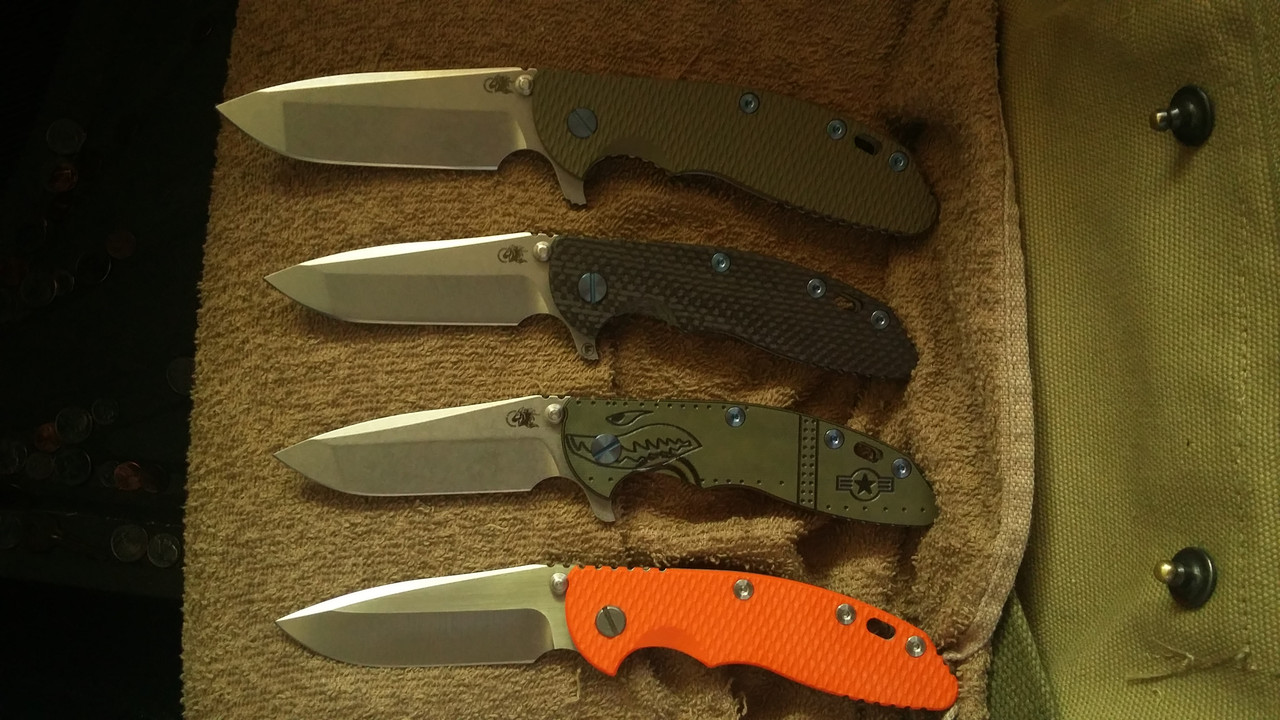 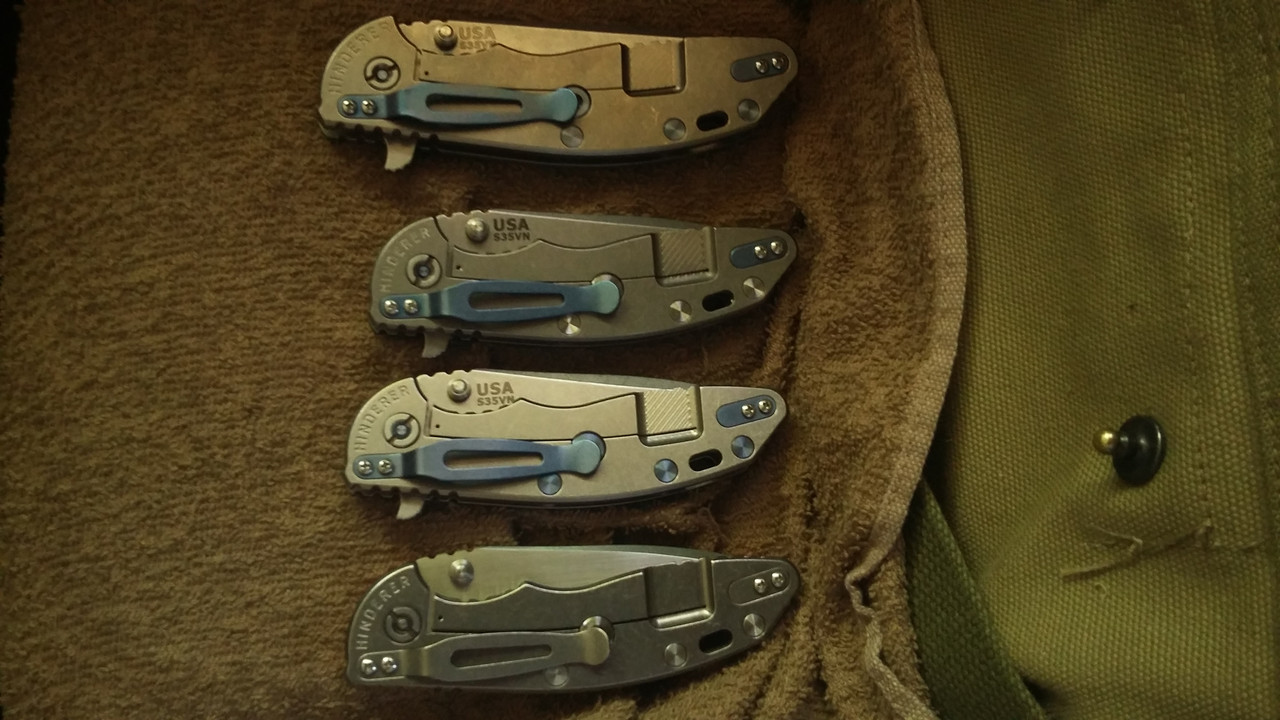 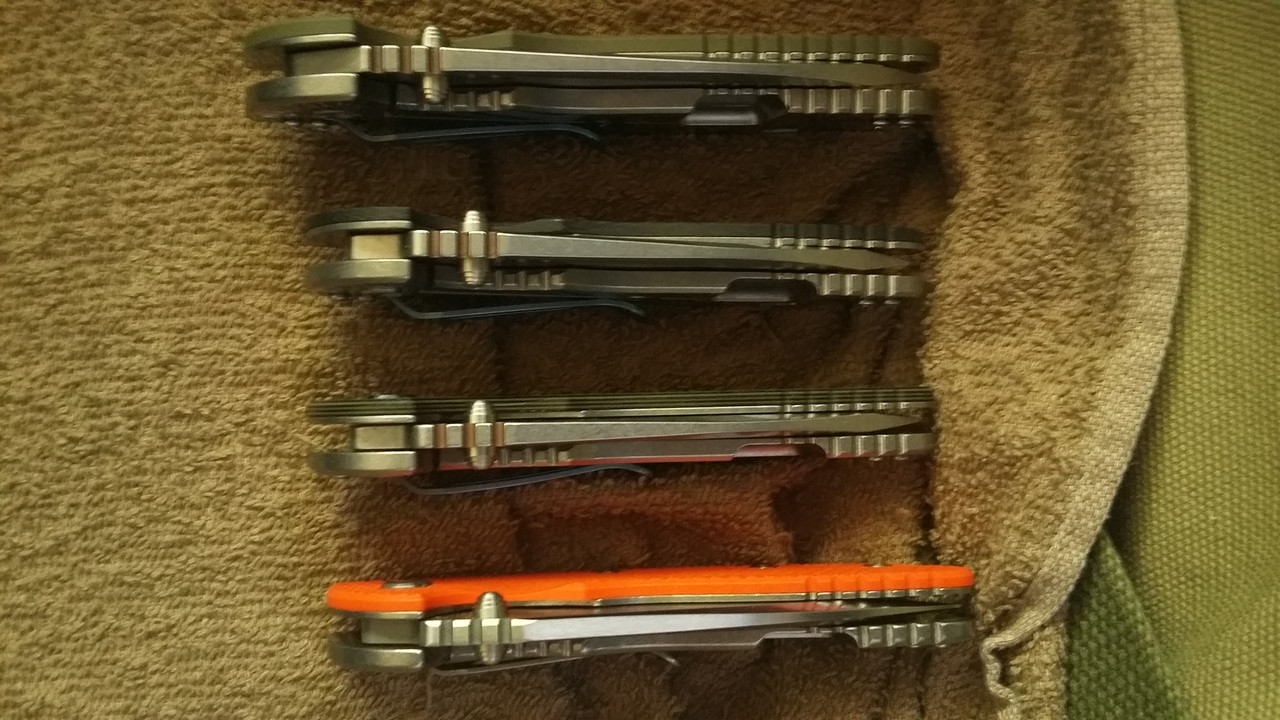 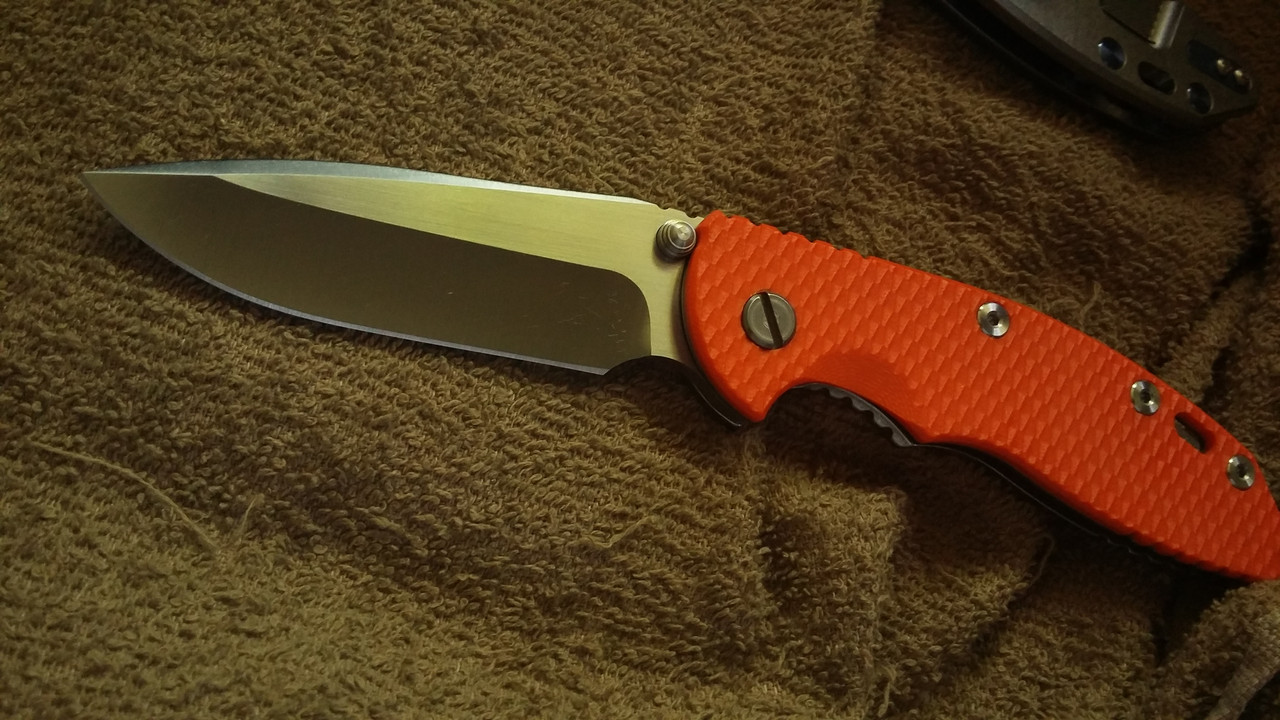 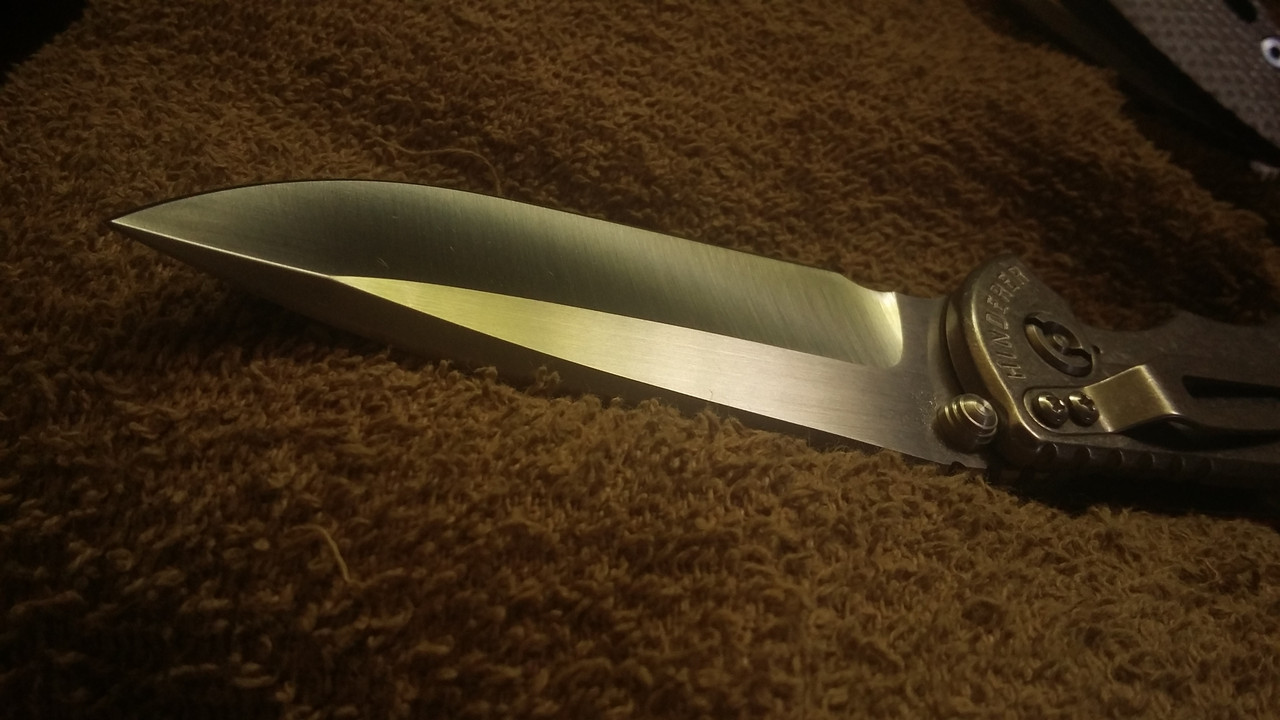 Very stout, highly functional, wonderfully precise, every one of them.
Edited by Lofty (05/08/18 03:10 PM)
_________________________
Cadent a latere tuo mille, et decem millia a dextris tuis;
ad te autem non appropinquabit.
|
|
Top
|
|
|
|
#171028 - 05/09/18 05:32 PM
 Re: The Big Tough Folder...
[Re: Lofty]
Re: The Big Tough Folder...
[Re: Lofty]
|

Knife Enthusiast
Registered: 03/20/06
Posts: 1859
|
So, Lofty...
We will find you selling knives at Hinderer's table at the Blade Show?
It is still a "'stand in line" or "take a ticket and hope" situation with them?
Larry
_________________________
Larry W. Williams
RKCC #CM-041
ABKA #046
RKS #1246
|
|
Top
|
|
|
|
#171029 - 05/09/18 05:42 PM
 Re: The Big Tough Folder...
[Re: LarryWW1246]
Re: The Big Tough Folder...
[Re: LarryWW1246]
|

Knife Enthusiast
Registered: 02/06/16
Posts: 656
|
I have not been to a BLADE show in at least 10yrs, so that will not change. As far as I know, he still must have a lottery for customs on his tables. He has only been making the XM line for 12yrs or so, is amazed it still in production, and assumption being in a few more years, maybe no line? One can always hope, right?
Probably will go back to Reeves in this thread, as anything the size of old Buck 110 and Schrade was always considered a big, tough folder. And Reeve knives are all of that, even though mostly a gent's crowd showpiece, as for who buys them. Heck, I wish I had not given away my old folders to kids, the Puma the only old one left.
If it is a good knife, I will say so, and give as much detail as possible as to what I like and do not like. If Hinderer was marketing his knives as the finest cutting and finished cutters on the planet, and only for elite professionals, my disagreement would be obvious.
Edited by Lofty (05/09/18 05:51 PM)
_________________________
Cadent a latere tuo mille, et decem millia a dextris tuis;
ad te autem non appropinquabit.
|
|
Top
|
|
|
|
#171032 - 05/09/18 06:47 PM
 Re: The Big Tough Folder...
[Re: Lofty]
Re: The Big Tough Folder...
[Re: Lofty]
|

Knife Enthusiast
Registered: 02/06/16
Posts: 656
|
As for another good knife, the various Chris Reeve knives are excellent. No crowbar, but seriously refined cutters of excellent geometry blades, and superbly precise, light, strong handles. As everyone knows, the first popular titanium intergral/frame lock, changing the knife world. Others will be discussed, but first will simply get out of the way any discussion as to what is the best. Best at what? To my mind, the big, tough folder as a user, and not decorator item. And there simply is one obvious THE BEST of the Reeve line, or, at least the Sebenza line. As what set the world on fire back a quarter of a century ago was the flat, smooth, super light, super strong, super simple, super precise, incredibly rust resistant framelock...it reaches its perfection of that idea by using extremely stiff, light, carbon fiber for one side, and using the titanium only where necessary, on the lock side. Also counter-intuitively, the damascus blade is the best hard use material, being 92% super clean, super fine grained carbide dispersion Böhler AEB-L (think copy Sandvik 13C27 and Mora knives, even held at same best hardness level of circa 57Rc), 8% 304 stainless for etching contrast, of very good toughness and resiliency, if not the extreme paper cutter edge holder of alternative S35VN. The latter an excellent steel so long as edge, tip, or blade not flexed past limits, where it chips or breaks, something true of most powdered metals, almost never used for springs. A fast hard cut into cardboard and a large staple, or into a hard little limb knot, etc, can end up being a problem, the damascus more able to tolerate impact out of axis line, easier to straighten edge with smooth steel, and easier to sharpen. Aesthetically, was suprised how well the damascus patterned light and dark steel bridged the gap from patterned black carbon fiber, to lighter matte grey deeply sandblasted titanium (not my favorite finish, at all, easily damaged, hard to repair, hard to alter). A very attractive thing, and again, not what one normally thinks of except in a safe, when it is the version most able to handle the rigors of field use, at least in the Sebenza line. A Reeve grind note, the recent grind is thicker in hollowground side of blade, that area thickening to tip from about halfway back, and notice full spine width until almost very end. Far tougher than a straight tapered, flat ground, anything, no matter what elite name. Both the Reeve grind and many flat tapered grinds go to very fine splinter picker tips, and a personal use choice as to that being appropriate for the use. Tougher than you might think, but still not "tough". The Hinderer uses same S35Vn steel as Reeve, at higher hardness, is very tough and chip resistant, but must accomplish this via edge, tip, and blade are extremely thick, and will not/cannot attempt to bend at that hardness/thickness, the handle springing before blade. No magic. Just mongo. Reeve keeps the hardness down a notch on his finer blades to maintain toughness. No magic. Just common sense. Tougher than many same material blades, and the damascus simply the fail-safe option. 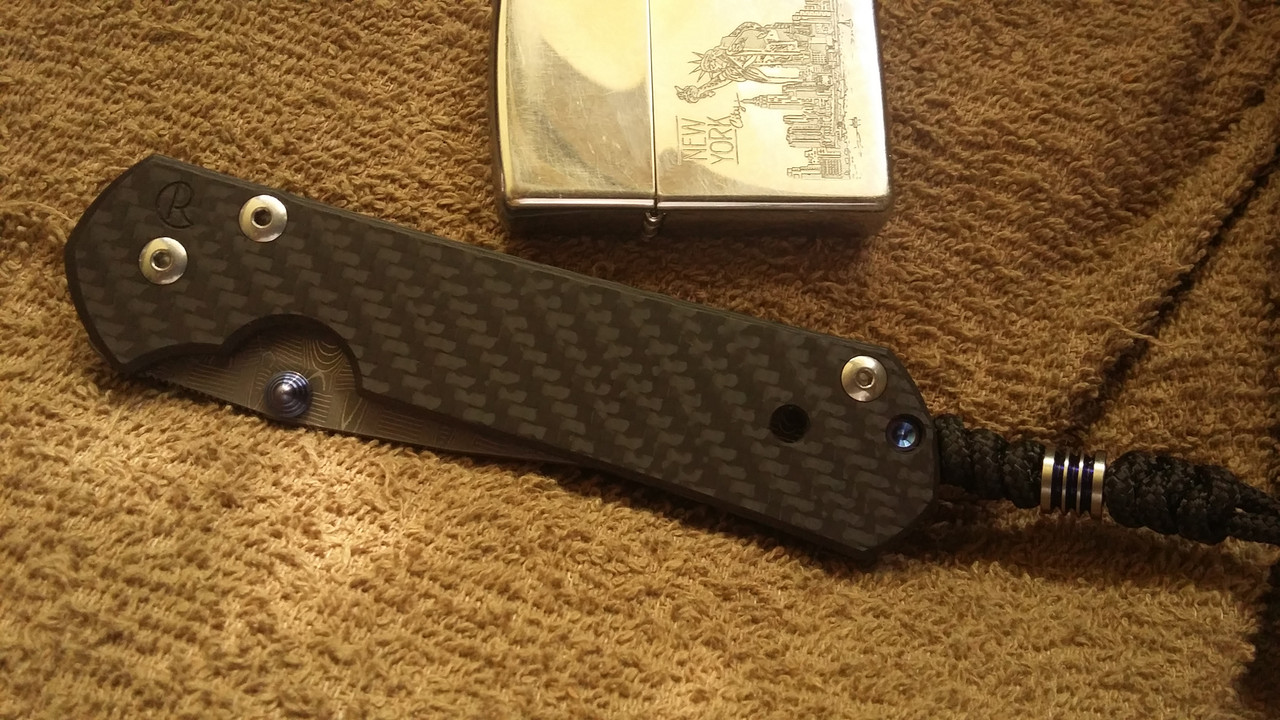 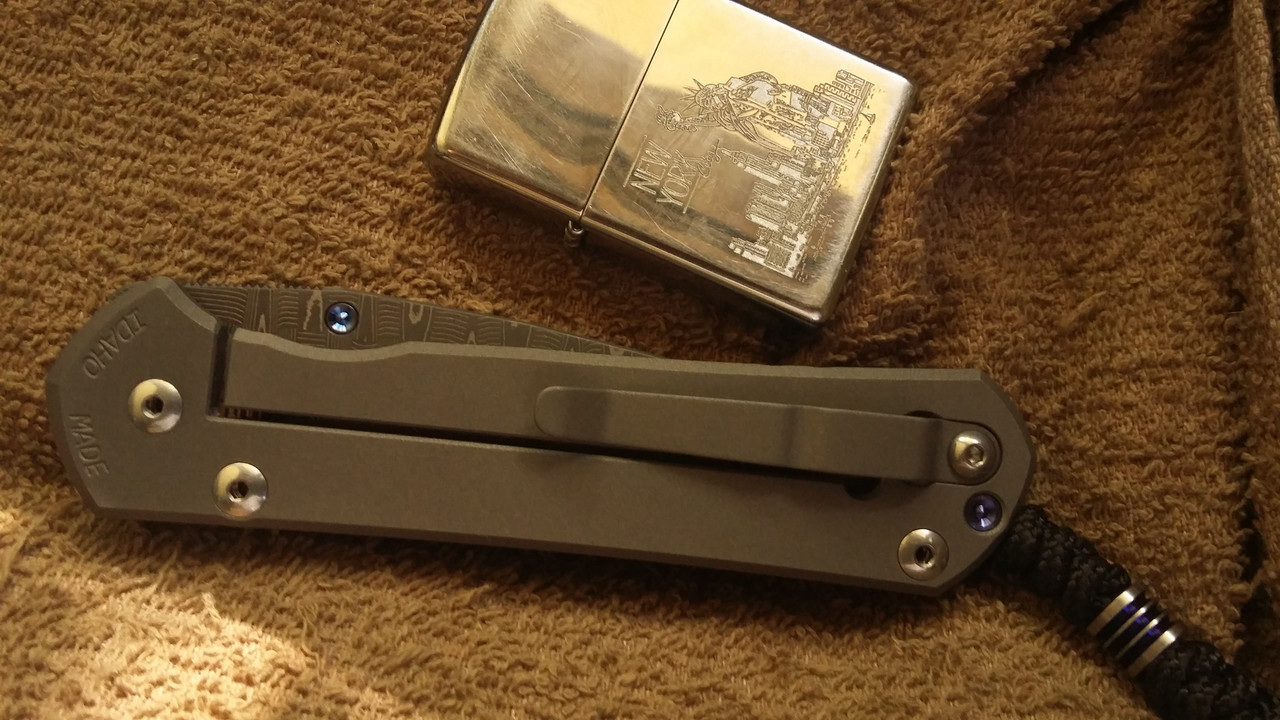 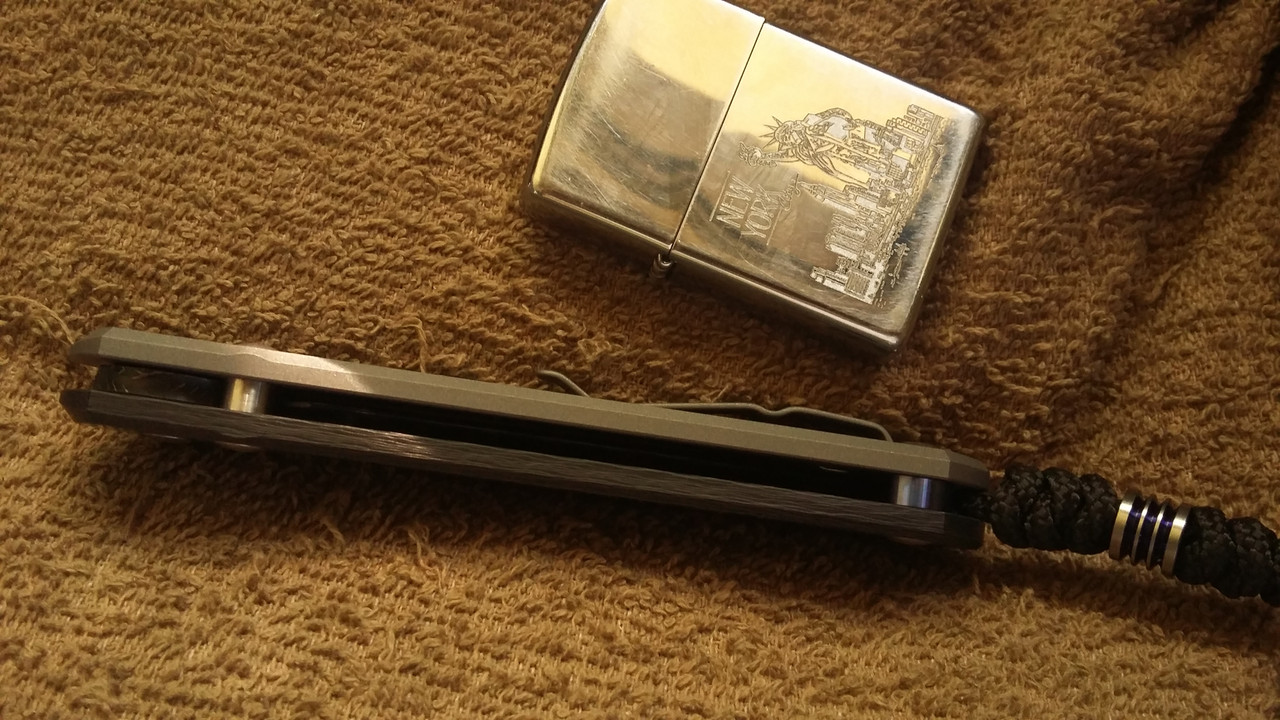 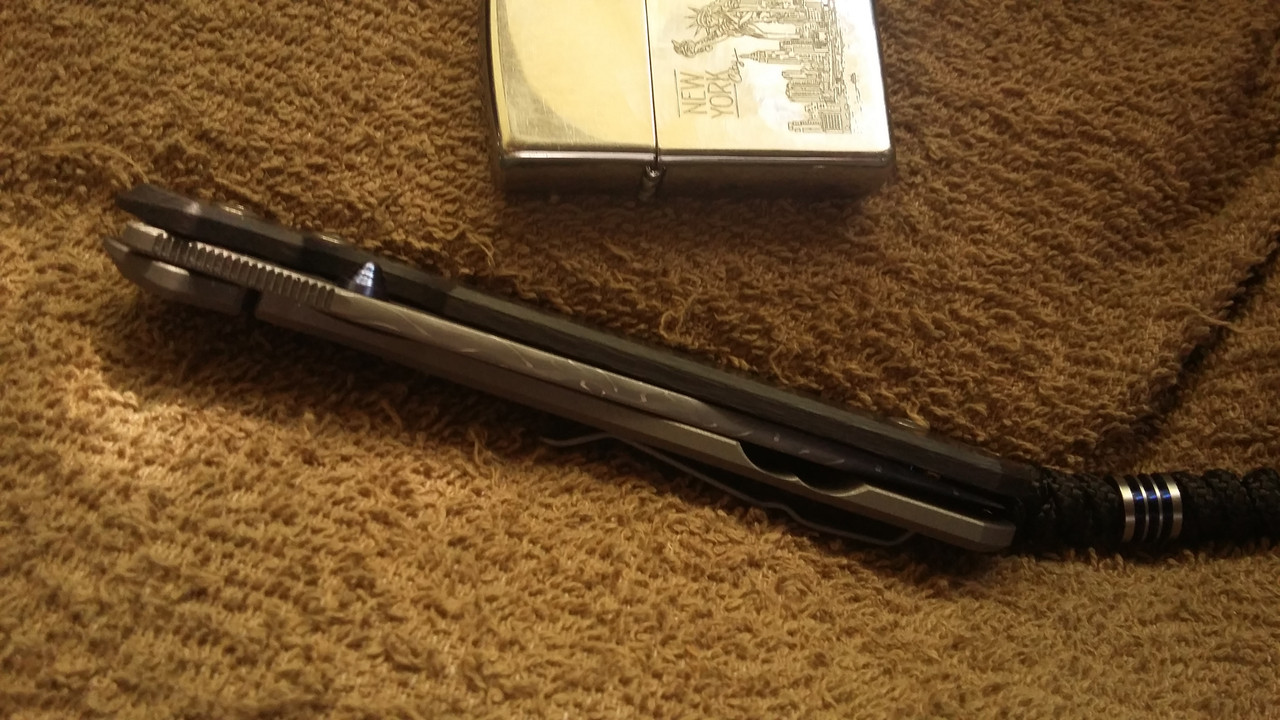 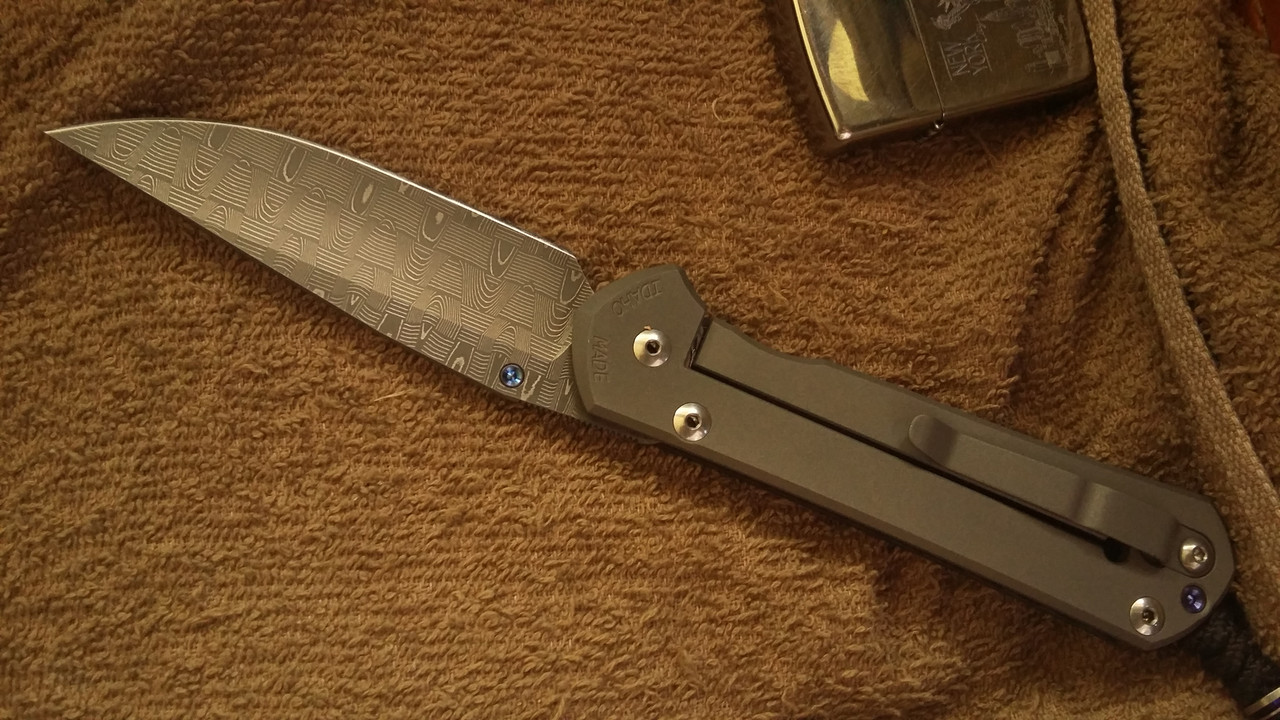 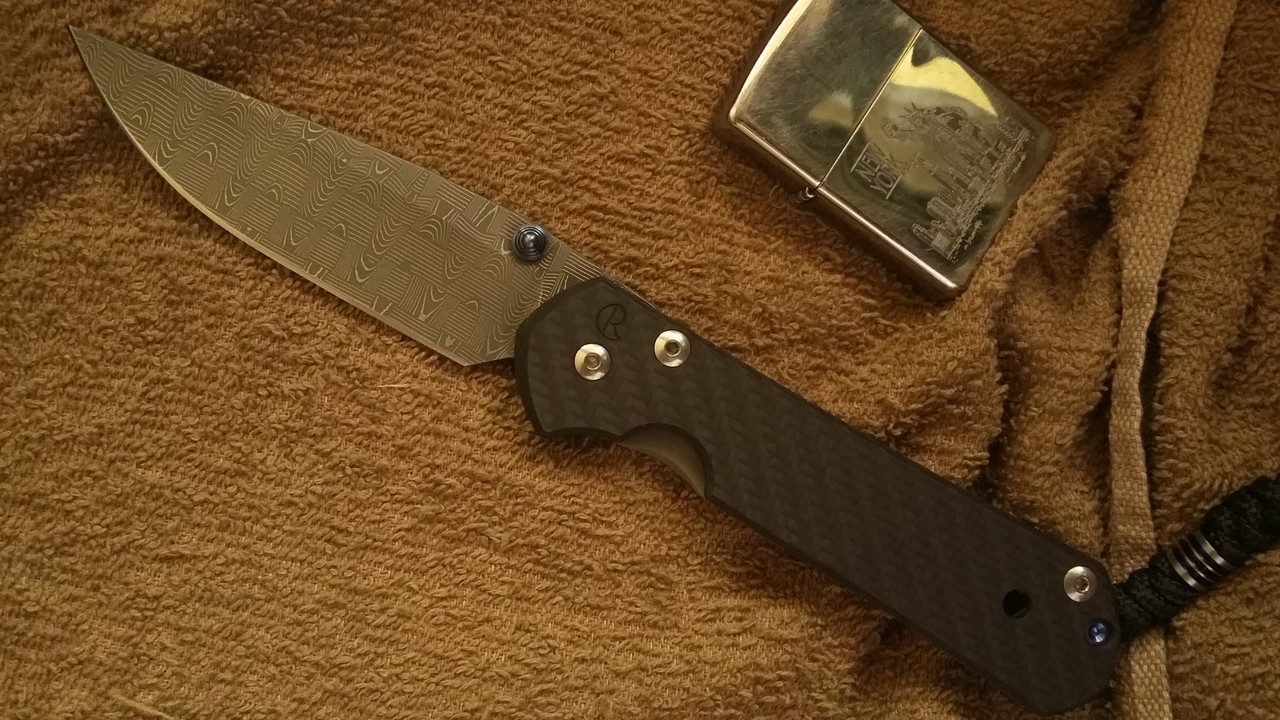 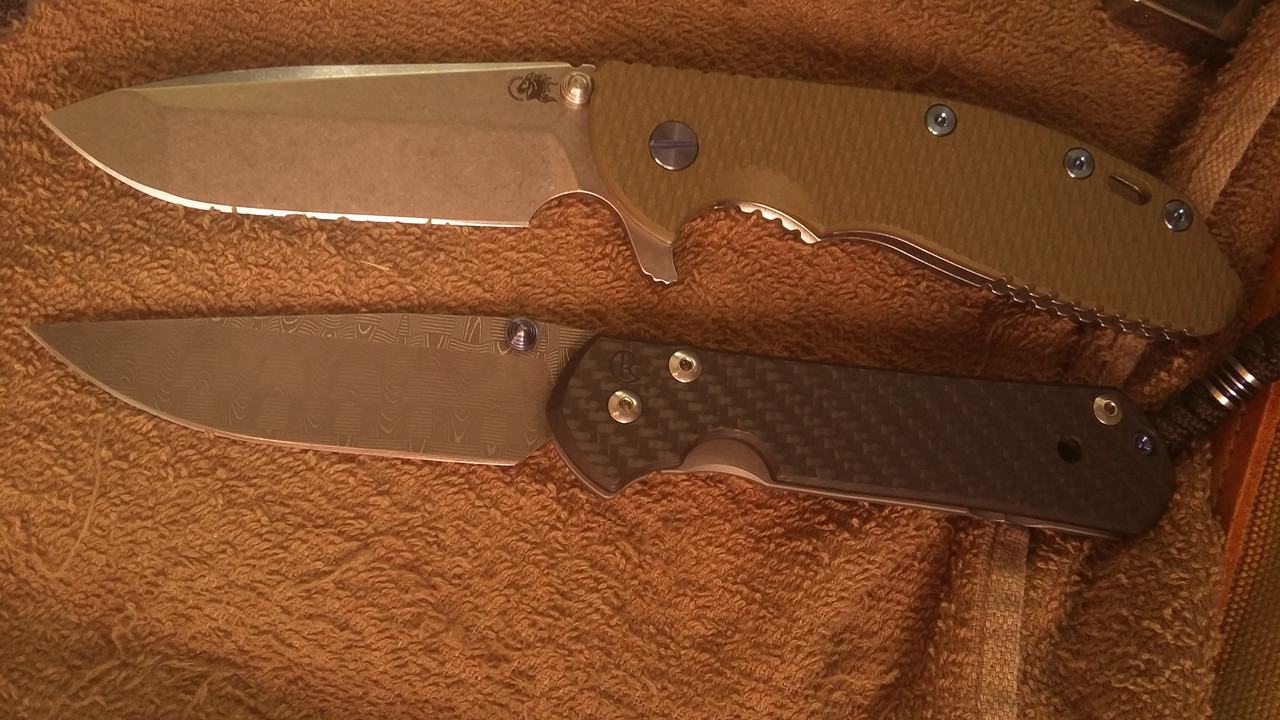 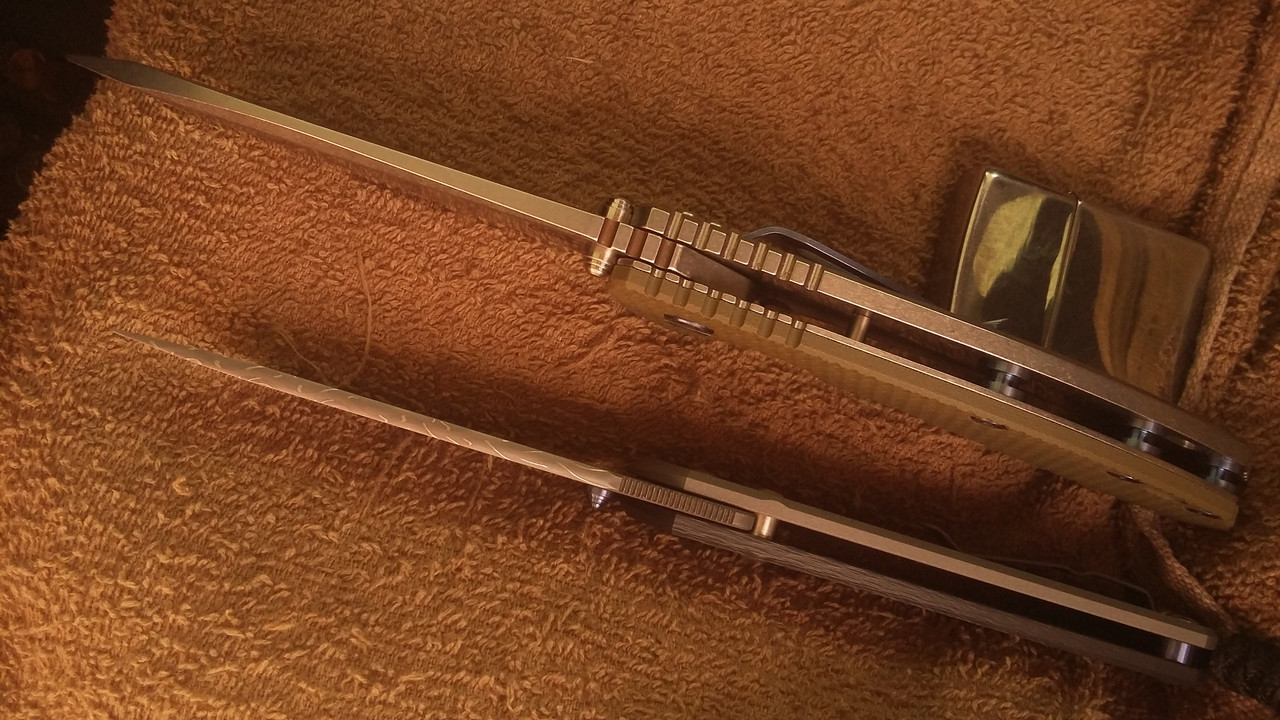 And yes, this one has been used and edge touched up. The damascus stainless quite abrasion resistant from scratches, and masks those scratches well. The pattern holds until, I guess, outer stainless wears away, moreso that simply wearing off oxide? As for wearing, the lock side carried IWB, clip under belt, and knife scrupulously never laid on a bare hard surface, and wish i had done so with others, where titanium sandblast looking more as worn parkerize today. PS-obviously forgot to mention weight. It weighs a mere 1/4 oz more than the all-plastic handled Spyderco Pacific Salt pictured elsewhere in this thread. This knife can be one travelin' dude, and where was it back when I could have REALLY used the snot out of such? For those doubting appropriate style and size of blade for most every field task, my bet is they would be too young to remember dressing out deer just fine with an old trapper folder and stone to keep edge fresh, and having no trouble making a camp/cooking fire with same.
Edited by Lofty (05/09/18 10:44 PM)
_________________________
Cadent a latere tuo mille, et decem millia a dextris tuis;
ad te autem non appropinquabit.
|
|
Top
|
|
|
|
#171052 - 05/10/18 07:28 PM
 Re: The Big Tough Folder...
[Re: Lofty]
Re: The Big Tough Folder...
[Re: Lofty]
|

Knife Enthusiast
Registered: 02/06/16
Posts: 656
|
I cannot editorialize on Reeve, as I have only questions. Back in those heady days of the 80s-90s, Reeve astounding with his titanium framelock, the true elites of military world clamoring for, and getting, new exotic lightweight, rustproof toys such as the earliest MPKs by Mission, which gents were aerospace metals experts, only, and demanded by SEALs to simply copy a Mad Dog design....one HAS to figure actual knifemaker Reeve was approached to make beefier knives for such boys? In any case, it never happened back then, leaving the door open for folk like Strider and Hinderer to run with the idea. Although earlier Reeve Sabenza blades were a bit beefier and more full bellied than of late, they never were what one would term a harsh use knife, but, a very refined cutter of Buck 110 size, much lighter, far better steels and blade design. Of relatively late, the Reeve firm has introduced several knives, most of which will not be covered, because if I cannot type it, I will not own it, knives such as the Umathurmond or whatever. But it is a large heavy duty folder, blade stop studs against frame front (with rubber bumpers?), and prepped them for further beef-ups of the line. They introduced a heavier duty Sebenza 25 which was not well accepted as a replacement for the little changed over the years, now stock, Sebenza, of 21 nomenclature. The 25 was quite different, had a few bugs, was only recently withdrawn, tweaked, and rebranded as the Inkosi, which also used some things from the Ummagumma or whatever. The Sebenza 21 is still in the line, as is the Inkosi, and are their staples, and one cannot help but feel they would be happier if the Inkosi still became the Sebenza successor, given the recent $40 price hikes given to Sabenzas, alone, to bring their price up to equal that of the heavier duty Inkosi. Which brings us to the present, and pictured below. The stronger knives. The Sebenza deep hollow grind and beautiful cork wheel finish seems to be gone entire from the line, perhaps to include the latest embellished knives, from what I can see from vendor site photos, anyhow. The grind line of the deeper version more a 90deg turn at the handle, the new grind angles back, as for spotting. Only an aesthetic thing, but, when you sell premium goods, it had better be good. The new thing is total stonewash (which admittedly hides scratches better by being prescratched), stronger thicker hollow grind, and I will say the knives still cut like blue blazes. They also have introduced the stouter sheepsfoot, along with about everybody else, a wonderful blade, whether Benchmade, Spyderco, or Reeve. It, also, has a thicker grind, and is offered in the 21 and Inkosi line, the blade style termed Insigo in their relentless Zulu name ways. A quick foray into the marvelous engineering of the Sebenza is necessary at this point. The sides and spacers are meticulously machined so that the handle sides remain dead parallel to within circa half a 10 thousandth. This is required due to blade hinge design, such as on a precision hinge used on exotics such as aircraft spoilers or older and more finely crafted internal combustion engines. The blade has an oversize hole, through which fits a cylindrical bushing, the bushing slightly longer than blade thickness, by precisely the thickness of bronze thrust bearing washers fitted AROUND the protruding bushing on both sides, and all dead flush. This is fitted into the precisely gapped handle sides, and an internally threaded pivot inserted through handle/bushing/handle, and cap retainer screw at pivot far end installed, retaining the pivot. This means when the screw tightened down against handle drawing both together, the handle sides bottom on the ends of the bushing and against the thrust washers, with zero direct force applied to blade. When properly tensioned, this allows the thrust washers to rotate, the bushing to rotate, and the blade to rotate about the bushing, with near zero sideplay. At no point does the pivot rotate, and not only does it not require loktite, but such is sternly warned against, and likely not warranted. It is a hidden marvel, folk, and 20yrs ago, my thought that simply a much larger, otherwise identical version, with thicker blunter tipped/edged blade would have sold like hotcakes with the crowd tasked with digging empties out of asphalt for evidence, or breaking ammo pallet straps. The mechanism is no loosey-goosey butterfly knife flicker, nor even the smoothest, rather, the zero/zero close tolerance fit more akin to something massive sliding on greased rails to solid thunk of locking. Now, let's get to other beef-ups...the thicker bladed Inkosi, which I always want to call Inksigo after typing the blade style name. There is no taking away that it is stronger. Much larger diameter pivot, thicker walled as only a pivot and cap screw, no bushing through blade, a solid larger pin as blade stop, rather than smaller screw through another precisely machined spacer, it even floating through a close tolerance hole on one side, and the blade obviously thicker and stronger than even the beefed up Sebenza. Since it lacks the bushing, the handles simply clamp on the blade and enlarged/fixed thrust bearing washers, tension is screw adjusted, the pivot now like most other knives, free to rotate, and requires loktite to stay put. The frame has well designed finger grooves. As for personal problems with the design, the lowered lock side in a finger groove (also for now dual thumb studs) makes it much harder for my blue collar thumbs to disengage the lock bar. The elimination of the lanyard hole in back, and tying of lanyard around the simplified monolithic stainless spacer in back puts the lanyard at top rear corner of handle and hard against palm in a most annoying way. Removing the lanyard leaves the rear bare, and devoid of the color of any titanium bushing spacer, a greatly missed bit of brightness in a quite monotone knife, aside from thumbstuds. They have eliminated direct titanium lock bar contact with the blade, by inserting a large ceramic ball in the front interior corner of the bar, it pulls double duty as side detent ball and locking surface of the bar. But, if you want a harder use Sebenza style knife, there is no denying that they nailed it. Personally, I find one is enough, and still buy the odd Sebenza 21 while still being made, same as I buy the XM series Hinderer, and the earlier style minus his latest lock bar steel insert. 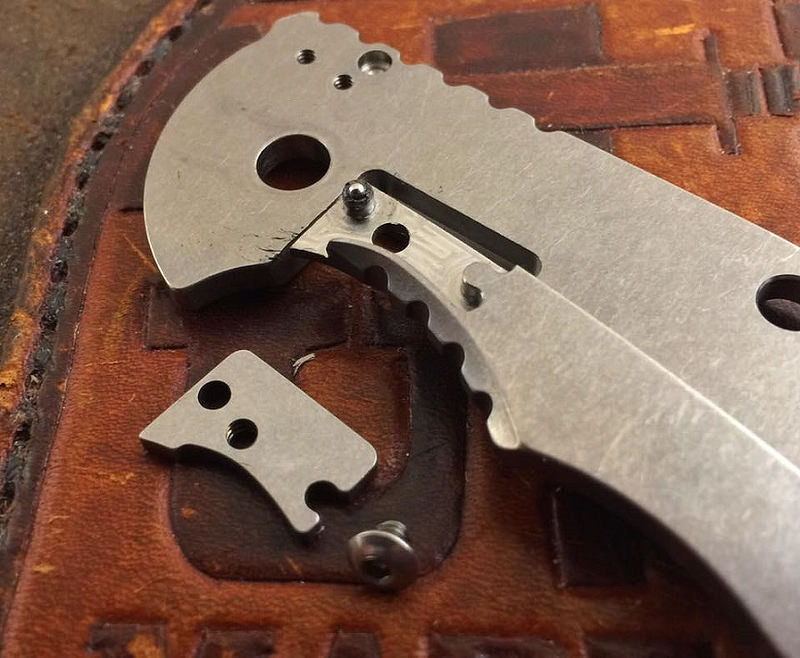 (sorry no Reeve ceramic ball pic, but, it's a ball) I do not baton my knives and no chronic flicker, both Reeve and Hinderer bare lock bars will outlast me. And I personally question both designs as to concentrating all force in an even smaller areas, except only to titanium on the back side of whatever device. Only time will tell, but not on my dime. 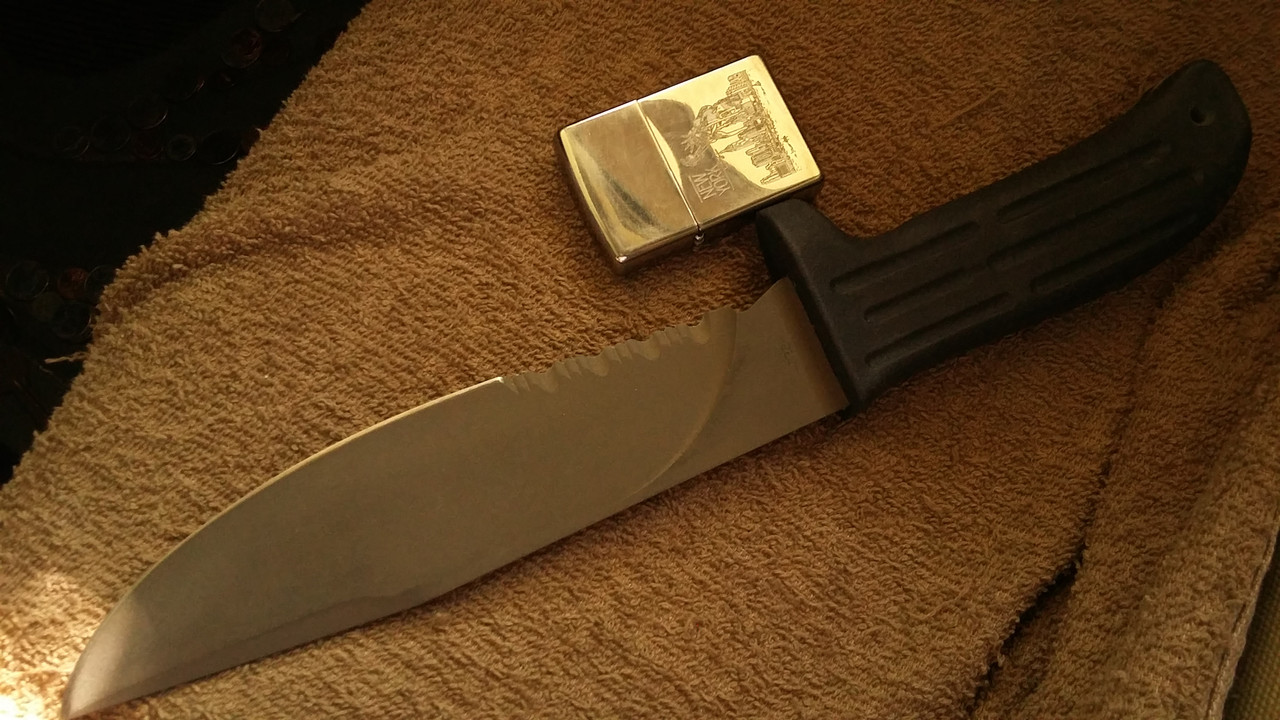 older and newer grind 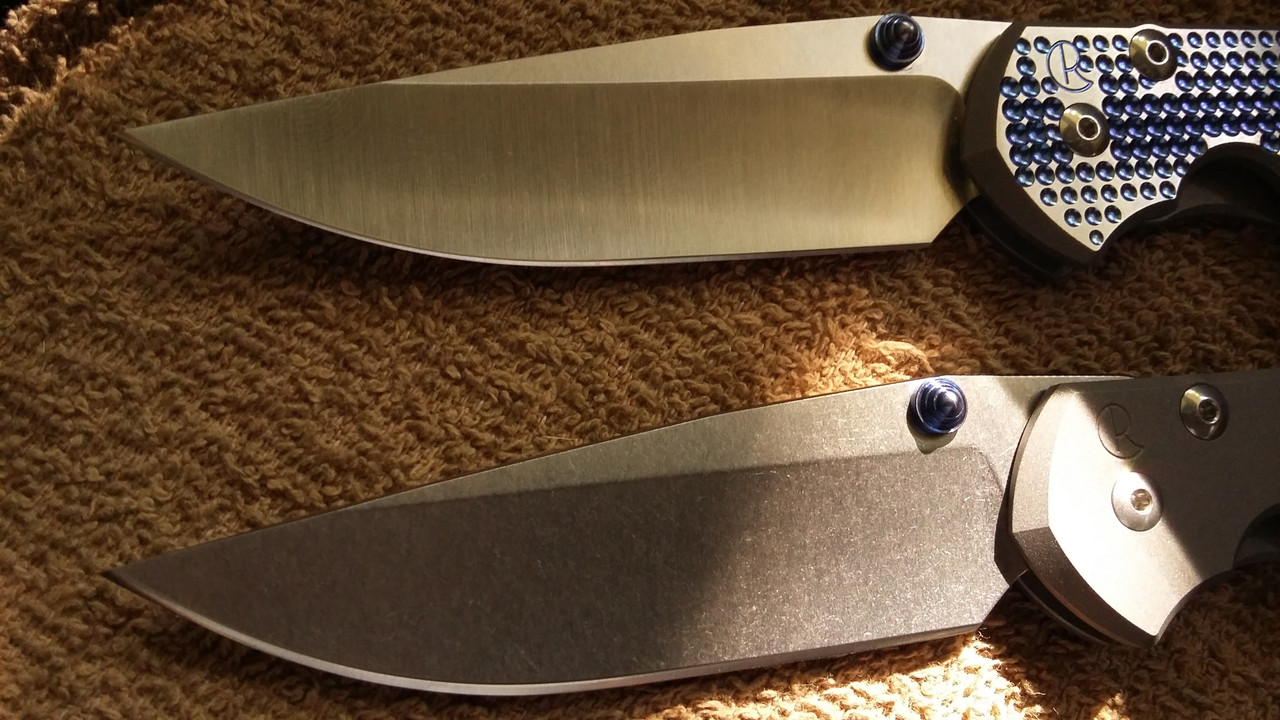 Inkosi top and Sebenza bottom 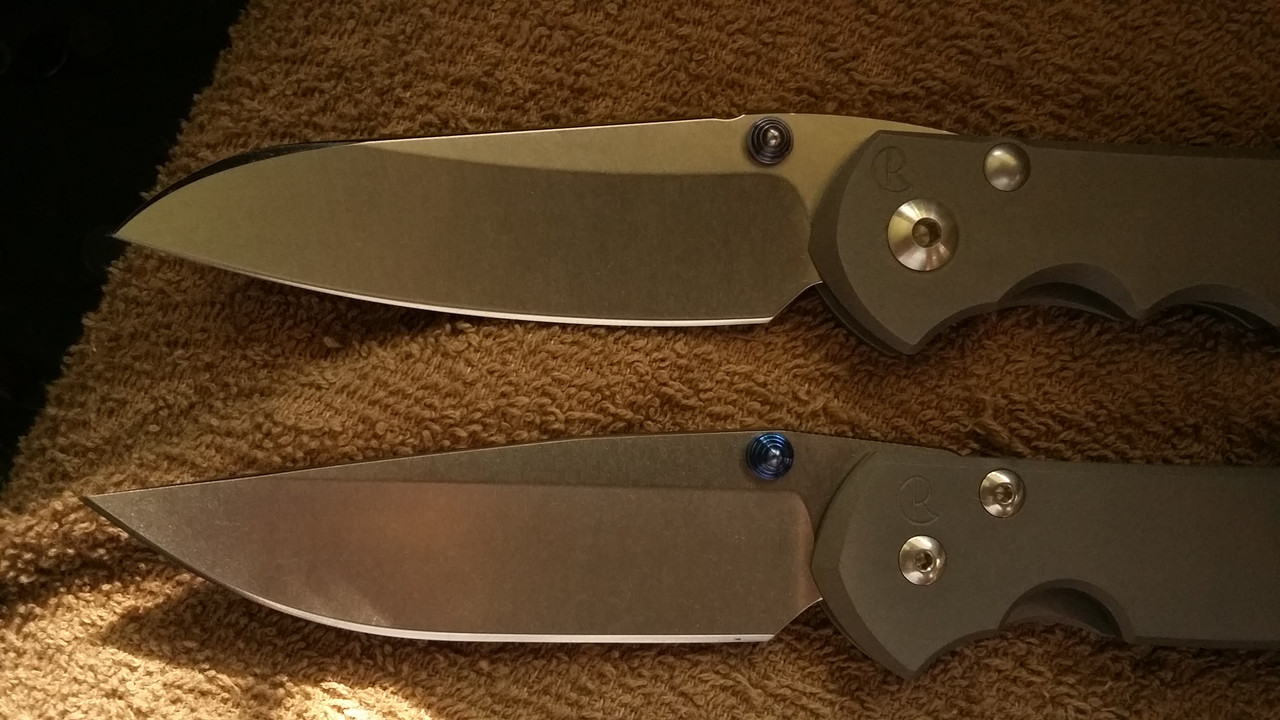 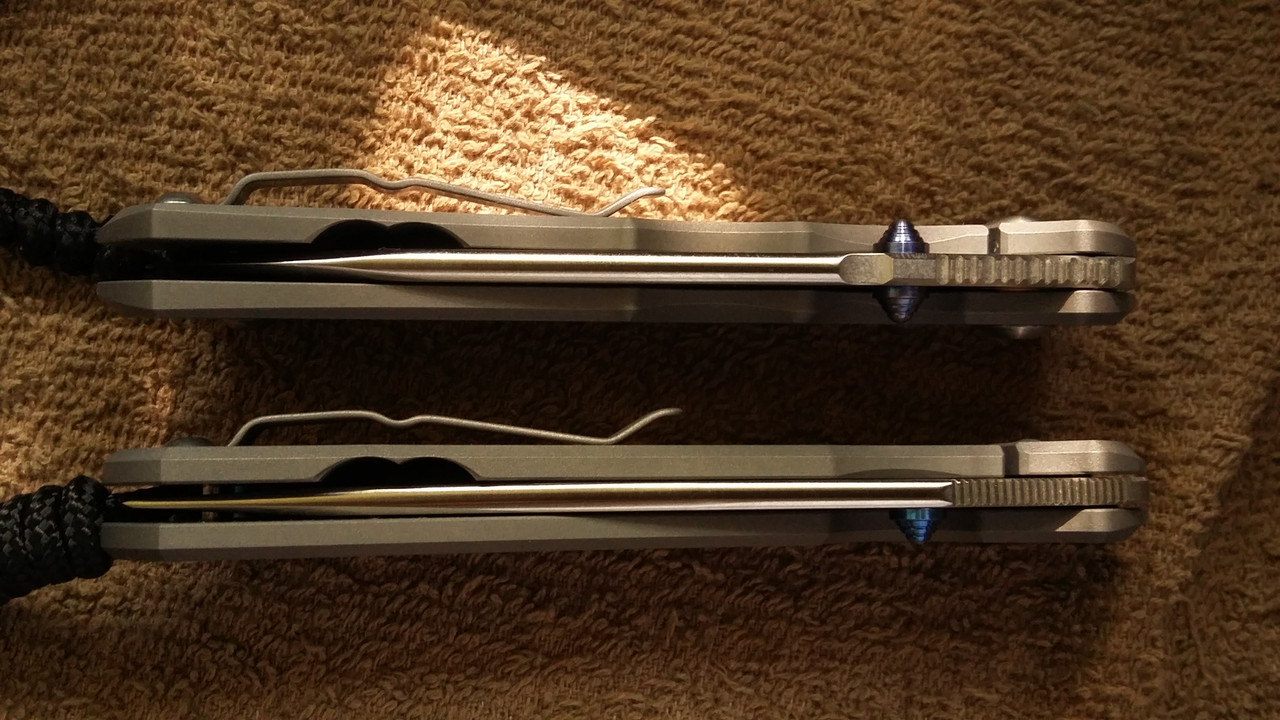 Rather picture poor on Sebenza/Inkosi comparisons, botched them, and will add tomorrow with better light. With both the Hinderer and Reeve as integral frame lock folders with thumb studs or flippers, none are my ideal of big, tough folders for constant daily use of deploying/folding. All three surfaces, lockbar, stud, and flipper, put uncommonly large amounts of poorly leveraged force against small areas of finger or thumb when properly tensioned for safety, and become annoyingly painful, quite fast, as if a very oversprung poor leverage lockback. Would very much prefer something as a large well leveraged midlock back with an opening hole such as Spyderco uses, but with blades such as pictured here, including Reeve cutting edges near total blade length and stop stud in blade against frame front. Nothing even close, aside from an absurdly large Spyderco lockback, which, of course, I had to buy, even though blade too thin to scale for such a large knife. Still waiting.
Edited by Lofty (05/11/18 10:27 PM)
_________________________
Cadent a latere tuo mille, et decem millia a dextris tuis;
ad te autem non appropinquabit.
|
|
Top
|
|
|
|
#171069 - 05/10/18 10:25 PM
 Re: The Big Tough Folder...
[Re: Lofty]
Re: The Big Tough Folder...
[Re: Lofty]
|

Knife Enthusiast
Registered: 02/06/16
Posts: 656
|
As a separate post, which was forgotten to be inserted into the carbon fiber Sebenza post, is a following review/torture test. Keeping in mind that any sprung lock will bounce during severe shock to blade, and that if a second shock happen while lock fully or partially bounced into unlocked, will only magnify deformation of locking surfaces and/or collapse blade at moment of stress. The liner or frame lock acts as a compressed and expanding leaf spring during such use. All a matter of timing and luck, bad or good, when clubbing one like a baby seal. Of main interest will be in how a standard Sebenza 21 with S35Vn blade, pivot, and handle hold up, even when half carbon fiber. Hard to fault the knife, or deny it being a big tough folder. Certainly more than tough enough for something of its thin profile and feathery weight. In line with above questions as to lack of tougher knives earlier, same with carbon fiber which had to have been brought up far far earlier, and remains only a quite recent dealer exclusive, period. Do I think the damascus edge would have fared as well? Not at all. But, I am one of those unimpressed by edge holding champs which chip when something hard is struck, and which in a silly old fashioned way, consider not chipping as part of edge holding of a far more critical nature than only needing to iron out edge with a smooth steel to complete a job . https://www.youtube.com/watch?v=rxCKW1KiGp4
Edited by Lofty (05/11/18 02:25 AM)
_________________________
Cadent a latere tuo mille, et decem millia a dextris tuis;
ad te autem non appropinquabit.
|
|
Top
|
|
|
|
|
|



